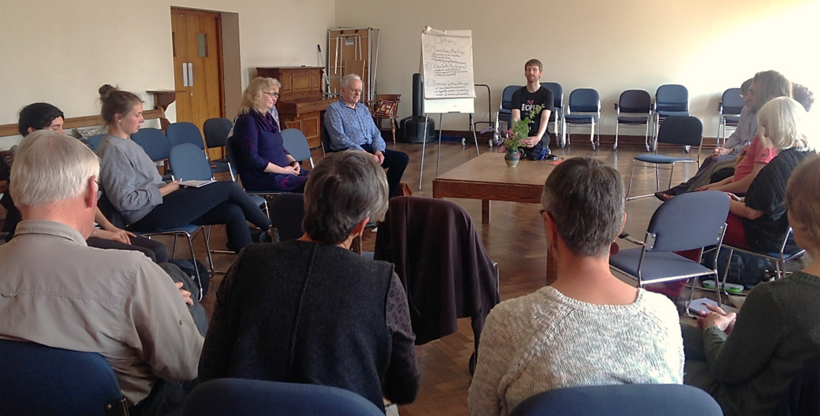Supporting Bristol City of Sanctuary
Bristol Redland Quakers were motivated to work together to support refugees in Bristol after realising they could have more impact if they worked together on an issue. Following Quaker discernment they decided to support the Bristol City of Sanctuary movement.

Here in Redland over the past couple of years we've been trying to work out how we might be able to act collectively as Quakers. Many Friends were working individually for several good causes in Bristol, and continue to do so, but we felt that if we could find a way of working together effectively we might achieve greater and more long lasting impact in a particular area.
Focusing our activity
There were a few areas we might have focused our activity on, including food banks, climate change or defending the NHS but, by a process of discernment and dialogue, those of us interested in collective action chose working with refugees, in support of Bristol City of Sanctuary. The City of Sanctuary movement aims to build a culture of hospitality for people seeking sanctuary in the UK.
Several Redland Friends had been working in this general area, and a decade ago our meeting supported the creation of Bristol Refugee Rights; today it runs one of three welcome centres for refugees in the city. Refugee and migrant support projects have featured prominently in our weekly appeals programme and in our meetings for learning in recent months.
Supporting City of Sanctuary
Last autumn Meeting for Business approved the creation of an external action team, initially consisting of six people, to support Bristol City of Sanctuary. The team sends a representative to the steering group for City of Sanctuary, and has embarked on coordinated action in a number of projects. These have included a celebratory walk through the city and support for a shop setting up in our vicinity to distribute clothes and household supplies to refugees.
The team keeps our meeting informed about their actions, about what's happening in the refugee cause, and encourages others to join in. Through their own regular meetings as a group, they feed back experiences and thoughts to one another and look for new kinds of effective intervention that draw on and demonstrate Quaker values and character.
Finding practical ways to act collectively
Our meeting has participated in a Turning the Tide mini-course of three one-day workshops. People from our own and neighbouring meetings explored the challenge of collective Quaker action, trying to find practical ways to marshal our resources to make progress in our areas of concern. We imagine that, if action teams spring up across local meetings, networks will emerge to enable coordinated action in a region.
At the meeting there is an attender who is a refugee from Iran. Hearing his story has been a great motivation for our work, and forming a friendship with him has been a source of joy for the meeting. Another attender spoke movingly about his own experience as a refugee at a residential weekend we held on the theme of 'refuge'.
The children in this meeting have joined in enthusiastically with our consideration of what we should be doing for refugees. They started a knitting project to raise some money and have encouraged all of us to do more.
A national programme?
In our consideration of possible themes for a national programme of Quaker action around forced migration, we particularly support the ideas of creating meetings of sanctuary and of improving conditions in detention centres. We also hoped there will be room in the programme for celebrating the richness of multicultural life and for spelling out and opposing the inhumane and iniquitous features of the present asylum system in the UK.